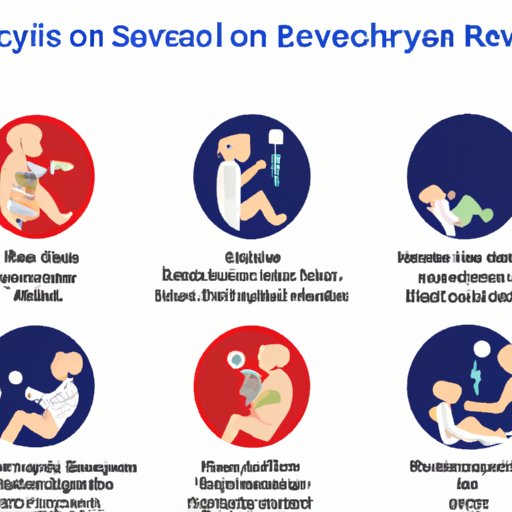Introduction
Respiratory syncytial virus (RSV) is a common virus that affects millions of people worldwide. It’s particularly dangerous for infants and young children, as well as older adults and people with weakened immune systems. In this article, we’ll explore the different types of RSV symptoms, how to recognize them, and how to manage them.

Exploring the Different Types of RSV Symptoms
RSV can cause a variety of symptoms, ranging from mild to severe. In infants and young children, common symptoms include:
- Coughing
- Sneezing
- Fever
- Runny or stuffy nose
- Difficulty breathing or rapid breathing
- Wheezing
In adults, RSV symptoms may be similar to those of a cold or flu, including:
- Congestion
- Sore throat
- Coughing
- Fever
- Body aches
It’s also possible to have RSV without showing any symptoms. Mild RSV symptoms can be managed at home, but severe symptoms require medical attention.
Recognizing the Signs of RSV: Symptoms Every Parent Should Know
Parents should pay close attention to their child’s symptoms if they suspect RSV. In addition to the symptoms listed above, parents should also watch for:
- Irritability
- Trouble eating or drinking
- Lethargy or sleepiness
- Dehydration
In adults, RSV symptoms can also include:
- Shortness of breath
- Chest pain or discomfort
- Wheezing
It’s important to recognize the signs of RSV early, as this can help prevent serious complications.
How to Identify and Manage RSV Symptoms in Infants and Young Children
RSV is particularly dangerous for infants and young children. Parents can take several steps to prevent RSV, including:
- Washing hands and surfaces frequently
- Avoiding close contact with sick people
- Keeping infants away from crowded areas during RSV season
- Not smoking around the infant
If parents suspect their child has RSV, they should seek medical attention immediately. In addition to the symptoms listed above, parents of infants should also watch for:
- Breathing difficulties, including rapid or shallow breathing, flaring nostrils, and retractions (pulling in of the chest or stomach)
- Cyanosis (a bluish tint to the skin, lips, or nails)
- Fatigue or lethargy
- Dehydration
Treatment for RSV in infants and young children typically involves medications to help relieve symptoms, such as fever reducers and bronchodilators. In severe cases, hospitalization may be required.
RSV: Symptoms, Diagnosis and Treatment Options for Affected Individuals
If you suspect you or your child has RSV, your doctor will perform a physical exam and may order several tests, including:
- Nasal swab to test for the virus
- Blood tests
- Chest X-ray
Treatment for RSV depends on the severity of the symptoms. Mild symptoms can be managed with self-care measures, including:
- Drinking plenty of fluids to prevent dehydration
- Resting
- Using a cool-mist humidifier to help ease congestion
- Taking over-the-counter medications for pain and fever relief
In more severe cases, doctors may prescribe antiviral medications or recommend hospitalization to help manage symptoms.
The Common and Uncommon Signs of RSV: What You Need to Look Out For
While the symptoms listed above are the most common signs of RSV, it’s important to remember that some people may experience uncommon symptoms. These may include:
- Ear infection
- Pneumonia
- Seizures
- Apnea (pauses in breathing)
It’s also possible for RSV symptoms to be mistaken for those of other illnesses, such as the flu or a cold. If you suspect you or your child has RSV, seek medical attention right away.
Understanding the Early Warning Signs of RSV: Protecting Babies and Children
The best way to protect your child from RSV is to recognize the early warning signs. These may include:
- Rapid breathing
- Wheezing
- Coughing
- Difficulty breathing
If you suspect your child has RSV, keep them isolated from others to prevent the spread of the virus. You should also wash your hands frequently and avoid close contact with others yourself.
Tips for Managing Symptoms of RSV in Children and Adults
If you or your child has mild RSV symptoms, there are several steps you can take to manage them at home. For adults, self-care measures may include:
- Drinking plenty of fluids
- Getting plenty of rest
- Using over-the-counter medications for fever and pain relief
If your child has RSV, you can also try the following home remedies to help ease symptoms:
- Running a cool-mist humidifier in the child’s bedroom
- Gently suctioning mucus from the nose with a rubber bulb syringe
- Offering fluids to prevent dehydration
- Using a saline nasal spray to help clear congestion
Conclusion
RSV is a common virus that can cause mild to severe symptoms in children and adults. It’s important to recognize the signs of RSV early and take steps to manage symptoms to prevent serious complications. By following the tips and advice in this article, you can help protect yourself and your family from RSV and stay healthy throughout the year.
